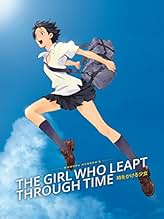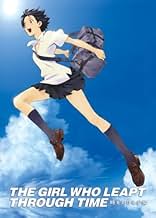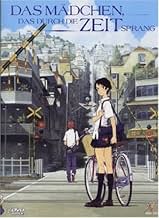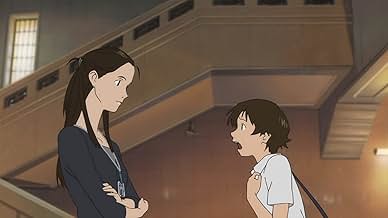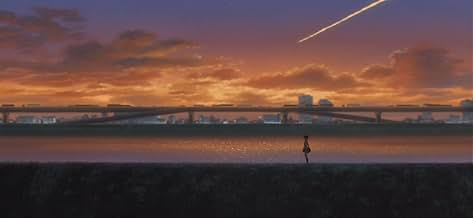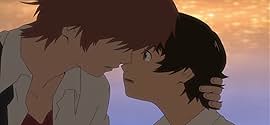Una niña de secundaria llamada Makoto adquiere el poder de viajar en el tiempo y decide usarlo para su beneficio personal. Poco sabe ella que está afectando las vidas de los demás tanto como... Leer todoUna niña de secundaria llamada Makoto adquiere el poder de viajar en el tiempo y decide usarlo para su beneficio personal. Poco sabe ella que está afectando las vidas de los demás tanto como la suya propia.Una niña de secundaria llamada Makoto adquiere el poder de viajar en el tiempo y decide usarlo para su beneficio personal. Poco sabe ella que está afectando las vidas de los demás tanto como la suya propia.
- Dirección
- Guión
- Reparto principal
- Premios
- 12 premios y 2 nominaciones en total
Reseñas destacadas
This terrific fantasy focuses on a girl who discovers she can jump back in time, and much of the movie is a light-hearted exploration of what a teenage girl would do with that power, which is essentially relive life better, avoid uncomfortable conversations, and eat pudding. The lead character is likably average.
There are a few oddities in this movie. Some of them are because it turns out, as I learned at wikipedia, that this isn't actually the same story as the novel upon which it is based but a sequel containing a character from the original movie, which explains a lot. Apparently the original story has been made into several movies and TV series in Japan, so the assumption was probably that everyone would understand a lot of references I didn't get.
Also, towards the end, we are given little pieces of information that suggest there is a whole other story to learn, although whether that story is in the original book or whether that would be the subject of yet another narrative I don't know.
Then there's the ending, which is logically unsatisfying and yet which I ultimately found emotionally resonant. It's one of these puzzling endings that has you reading wikipedia and going through the IMDb forum posts (which offer a lot of fascinating theories).
Well worth watching.
There are a few oddities in this movie. Some of them are because it turns out, as I learned at wikipedia, that this isn't actually the same story as the novel upon which it is based but a sequel containing a character from the original movie, which explains a lot. Apparently the original story has been made into several movies and TV series in Japan, so the assumption was probably that everyone would understand a lot of references I didn't get.
Also, towards the end, we are given little pieces of information that suggest there is a whole other story to learn, although whether that story is in the original book or whether that would be the subject of yet another narrative I don't know.
Then there's the ending, which is logically unsatisfying and yet which I ultimately found emotionally resonant. It's one of these puzzling endings that has you reading wikipedia and going through the IMDb forum posts (which offer a lot of fascinating theories).
Well worth watching.
10ethSin
There are about 10 Japanese films that I re-watch almost every year since their releases. "The Girl Who Leapt Through Time" is one of only three such animated films for me.
"The Girl Who Leapt Through Time" is based on a 1967 hit novel of the same title. The original work has been used in numerous film and dorama adaptations, most famous ones being the 1983 film directed by Oobayashi Nobuhiko. Instead of making just another anime adaptation and possibly becoming just another adaptation shadowed by the 1983 film, the producers took a risk by creating a spin-off movie with the setting of about 20 years after the original story. The gamble paid off big time, as the animated film went on to win at least 23 awards worldwide.
The underlying theme in this movie was "the importance of living the moment". Our protagonist was given the power to leap back into time to correct her mistakes, only to realize later that the short-term gains only lead to greater losses that followed. The story was extremely well-constructed to teach the lesson of embracing things the way they are, and never run from confrontations, because once that moment gone, you'll never get it back.
The director for this film did a phenomenal job of pacing and creating many memorable moments, but it was the live-action film screenwriter Okudera Satoko, who really made a difference for this movie by composing a story out of number of time leaps that slowly developed the main characters and made so many epic scenes possible. Many anime screenwriters fail in movies because they incorporate too many characters, as it is common practice in series, into the limited 100 minute time-frame. What's remarkable about this piece of work is that it focuses on only three main characters. Even counting the secondary cast, there are only 8 characters in total who we are given the names of. The limited number of characters not only improved character development, it also allowed the story to focus on the underlying theme.
I was actually very uncertain about the viewing this year because I started watching a lot of TV anime again since the last viewing. However, the only new flaws I've noticed was the excessive still motion in some scenes and most backgrounds, and that the protagonist was being a bit overly insensitive in few instances, which made her character a bit unrealistic. Animation is years ahead of its time, and it still is an excellent example of what happens when music is in harmony with the story/animation. The insert song by Oku Hanako, IMO, is still the best selection ever made among hundreds of Japanese films, anime, and live-action doramas I've encountered. Ending theme is a truly poignant one that really captured the mood and made the story sink in, and the music score throughout the movie has been used perfectly to enhance the drama.
"The Girl Who Leapt Through Time" is a timeless masterpiece that made me want to cherish every moment, and it's a movie I expect myself to be re-watching for many more years to come.
"The Girl Who Leapt Through Time" is based on a 1967 hit novel of the same title. The original work has been used in numerous film and dorama adaptations, most famous ones being the 1983 film directed by Oobayashi Nobuhiko. Instead of making just another anime adaptation and possibly becoming just another adaptation shadowed by the 1983 film, the producers took a risk by creating a spin-off movie with the setting of about 20 years after the original story. The gamble paid off big time, as the animated film went on to win at least 23 awards worldwide.
The underlying theme in this movie was "the importance of living the moment". Our protagonist was given the power to leap back into time to correct her mistakes, only to realize later that the short-term gains only lead to greater losses that followed. The story was extremely well-constructed to teach the lesson of embracing things the way they are, and never run from confrontations, because once that moment gone, you'll never get it back.
The director for this film did a phenomenal job of pacing and creating many memorable moments, but it was the live-action film screenwriter Okudera Satoko, who really made a difference for this movie by composing a story out of number of time leaps that slowly developed the main characters and made so many epic scenes possible. Many anime screenwriters fail in movies because they incorporate too many characters, as it is common practice in series, into the limited 100 minute time-frame. What's remarkable about this piece of work is that it focuses on only three main characters. Even counting the secondary cast, there are only 8 characters in total who we are given the names of. The limited number of characters not only improved character development, it also allowed the story to focus on the underlying theme.
I was actually very uncertain about the viewing this year because I started watching a lot of TV anime again since the last viewing. However, the only new flaws I've noticed was the excessive still motion in some scenes and most backgrounds, and that the protagonist was being a bit overly insensitive in few instances, which made her character a bit unrealistic. Animation is years ahead of its time, and it still is an excellent example of what happens when music is in harmony with the story/animation. The insert song by Oku Hanako, IMO, is still the best selection ever made among hundreds of Japanese films, anime, and live-action doramas I've encountered. Ending theme is a truly poignant one that really captured the mood and made the story sink in, and the music score throughout the movie has been used perfectly to enhance the drama.
"The Girl Who Leapt Through Time" is a timeless masterpiece that made me want to cherish every moment, and it's a movie I expect myself to be re-watching for many more years to come.
Based on Yasutaka Tsutsui's 1967 novel, - which has been adapted several times over the years, including 1983's The Little Girl Who Conquered Time - The Girl Who Leapt Through Time is a charming mix of drama and romantic comedy, with a slight infusion of science fiction ideas. Makoto (Riisa Naka) is a high school girl who, through serendipity, gains the ability to leap back in time (but she only manages moments or hours back). She has platonic relationships with two high school boys, Chiaki (Takuya Ishida) and Kousuke (Mitsutaka Itakura), and they spend their time playing baseball.
With her new-found abilities, she does nothing spectacularly profound, and the films intentions aren't to comment on paradoxes or to shift the space-time continuum as is usually the case with time travel narratives. Makoto uses her abilities to repeat events that pleasure her, to ace a school test, and also to avoid certain embarrassing situations with her friends. But as her relationships with, particularly, Chiaki and Kousuke, her leaps become more personally profound, as she attempts to possibly save the people she cares for (within the context of small human moments of danger, and not the usual global/country catastrophes.
I love the fact that in Japan, they do not distinguish between live- action cinema and animated (anime if you like) films, they are all simply movies. Now I'm going to contradict this with a Western perspective: This beautifully animated film is a delight to view, with its traditional two-dimensions, it is evidence to the west that 3D, computer generated animation is not the overbearing format, and 2D is still a genuinely viable medium. The film is filled with charming human moments, both touching and thoughtful. Teenage comedies rarely have this level of tenderness of character, that also explores concepts of fate, the passage of time and the intricacies of small human moments, and the delicate nature of human relationships.
www.the-wrath-of-blog.blogspot.com
With her new-found abilities, she does nothing spectacularly profound, and the films intentions aren't to comment on paradoxes or to shift the space-time continuum as is usually the case with time travel narratives. Makoto uses her abilities to repeat events that pleasure her, to ace a school test, and also to avoid certain embarrassing situations with her friends. But as her relationships with, particularly, Chiaki and Kousuke, her leaps become more personally profound, as she attempts to possibly save the people she cares for (within the context of small human moments of danger, and not the usual global/country catastrophes.
I love the fact that in Japan, they do not distinguish between live- action cinema and animated (anime if you like) films, they are all simply movies. Now I'm going to contradict this with a Western perspective: This beautifully animated film is a delight to view, with its traditional two-dimensions, it is evidence to the west that 3D, computer generated animation is not the overbearing format, and 2D is still a genuinely viable medium. The film is filled with charming human moments, both touching and thoughtful. Teenage comedies rarely have this level of tenderness of character, that also explores concepts of fate, the passage of time and the intricacies of small human moments, and the delicate nature of human relationships.
www.the-wrath-of-blog.blogspot.com
Rarely do I buy a film on DVD without having either read up about it or seen it first. The Girl Who Leapt Through Time was the first exception for me. For a dull anecdote, I walked through the store, saw it, and bought it, without knowing anything other than what was written on the back. When i got home, I didn't even start to watch it! But waited until after dinner to watch it, and to cut the already long story short, watching this movie was an experience! From the very first scenes I was grabbed. The artwork, I must say I adore, the scenery is beautiful. As for the storyline, sure, we've had time-travelling stories before, but there's never been one which after seeing it, made me want to watch it again (Seriously, as soon as it was over, I watched it again!) Cutting the even-longer story short again, I highly recommend this film, even those who are not lovers of anime might find themselves enjoying this film. Watching this movie was like an experience for me, and as odd as it may sound, I felt really warm inside after watching this. 9/10.
"I wonder how someone was able to create such a beautiful painting, when it must have seemed that the world was coming to an end."
When high school student Makoto inadvertently discovers that she's gained the ability to leap (literally) backward through time, she immediately begins using it to her advantage - with little concern for how and why she's gained this mysterious power. No problem is too trivial to be solved by a little time travel, from pop quizzes to uncomfortable conversations. But, nothing in the past can be changed without consequence, and Makoto's frivolous use of her ability may result in one or more of her friends being lost forever.
The Girl Who Leapt Through Time is about as mainstream and accessible as anime gets. The characters are all pretty normal, likable, and relatable. There's a lot of humor in the first half of the story, while the last half is quite serious, heartfelt, and poignant. The animation and character designs are clean and smooth, and have a very modern appeal. The score has a lot of piano pieces that occasionally caught my ear in a very pleasant way.
I recommend this both to anime fans, and to those who aren't particularly familiar with eastern animation. The story is an entertaining mix of moments both somber and lighthearted, the characters are great, and the visuals were top-notch. The Girl Who Leapt Through Time isn't just a good animated movie, it's good by any standards.
When high school student Makoto inadvertently discovers that she's gained the ability to leap (literally) backward through time, she immediately begins using it to her advantage - with little concern for how and why she's gained this mysterious power. No problem is too trivial to be solved by a little time travel, from pop quizzes to uncomfortable conversations. But, nothing in the past can be changed without consequence, and Makoto's frivolous use of her ability may result in one or more of her friends being lost forever.
The Girl Who Leapt Through Time is about as mainstream and accessible as anime gets. The characters are all pretty normal, likable, and relatable. There's a lot of humor in the first half of the story, while the last half is quite serious, heartfelt, and poignant. The animation and character designs are clean and smooth, and have a very modern appeal. The score has a lot of piano pieces that occasionally caught my ear in a very pleasant way.
I recommend this both to anime fans, and to those who aren't particularly familiar with eastern animation. The story is an entertaining mix of moments both somber and lighthearted, the characters are great, and the visuals were top-notch. The Girl Who Leapt Through Time isn't just a good animated movie, it's good by any standards.
¿Sabías que...?
- CuriosidadesThis movie is an indirect adaptation of Yasutaka Tsutsui's novel "The Girl Who Leapt Through Time" - the main character's aunt is Yoshiyama Kazuko, the protagonist of the novel.
- PifiasSpoiler: During the time-stop sequence Chiaki laments that he will not be able to see the painting he has come to the past for because it is in restoration and he will not be around the next day when it is put on the wall. But Makoto knows that the picture is worked on by her aunt and so they could just go upstairs and take a look at it (they may find the door locked but the possibility is not even mentioned). Chiaki's last jump could not have erased that memory because Makoto's knowledge predates the event.
- Citas
Yuri Hayakawa: [Makoto Leaves the room, then Yuri watches the Blackboard] Makoto: Time waits for no one
- ConexionesFeatured in Glass Reflection: The Girl Who Leapt Through Time (2010)
Selecciones populares
Inicia sesión para calificar y añadir a tu lista para recibir recomendaciones personalizadas
Detalles
- Fecha de lanzamiento
- País de origen
- Sitios oficiales
- Idioma
- Títulos en diferentes países
- La noia que saltava a través del temps
- Empresas productoras
- Ver más compañías en los créditos en IMDbPro
Taquilla
- Recaudación en todo el mundo
- 1.522.968 US$
- Duración
- 1h 38min(98 min)
- Color
- Mezcla de sonido
- Relación de aspecto
- 1.78 : 1
Contribuir a esta página
Sugerir un cambio o añadir el contenido que falta


